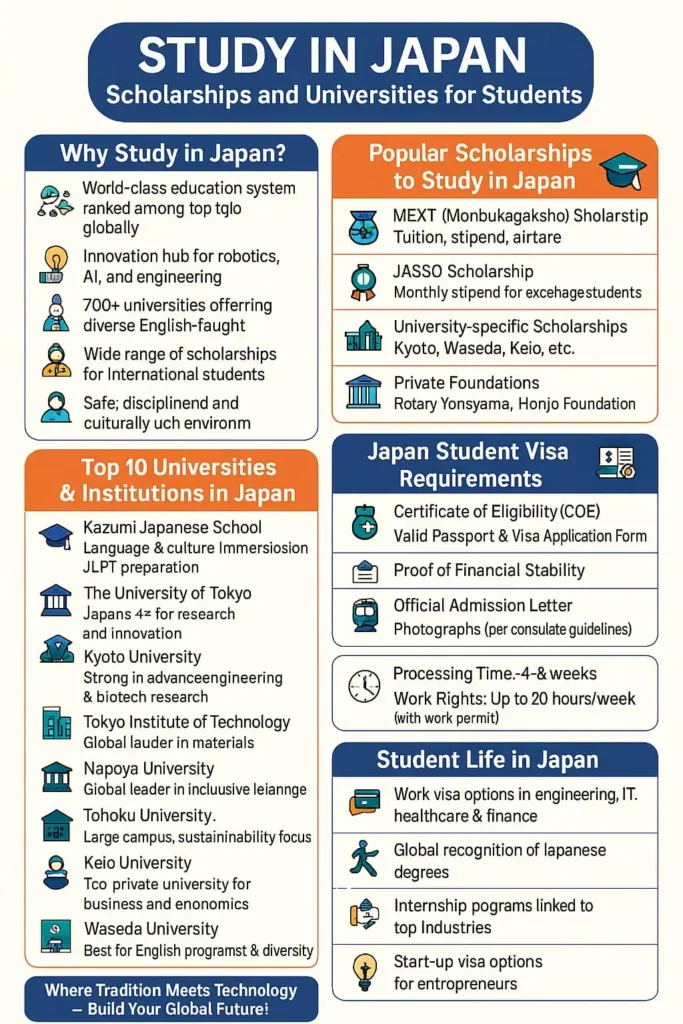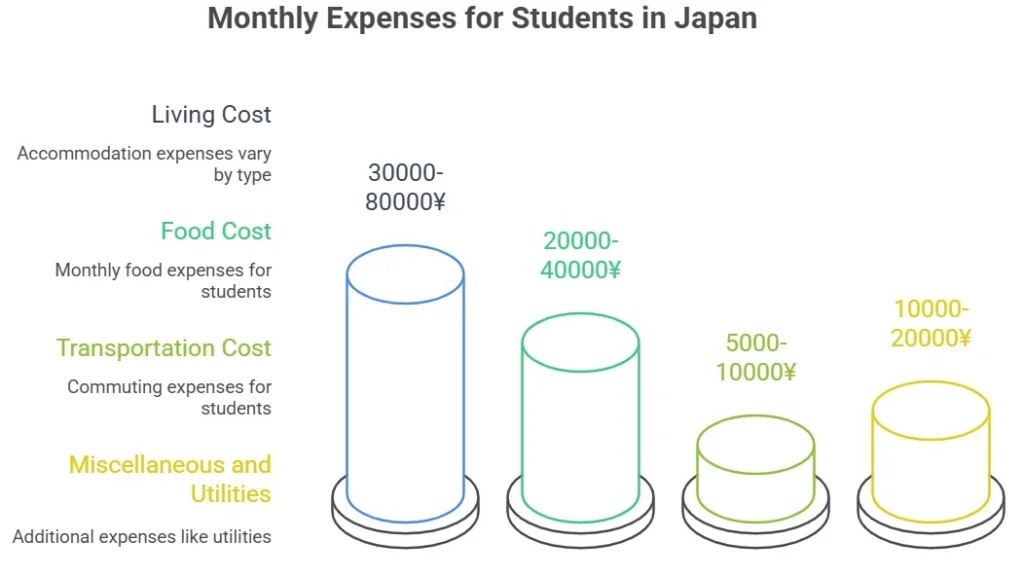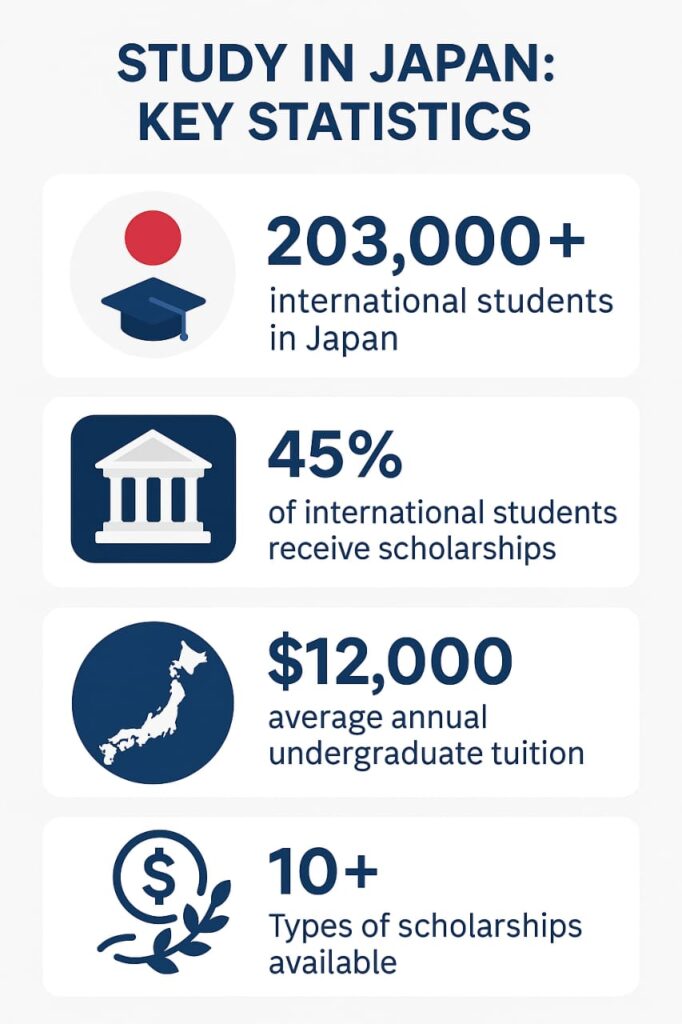Where innovation became tradition and nowadays, the world’s favorite place for foreign students to study. Where not degree — it is world-class international career skill life, world-class education life, and international country life. World-class education by world-class universities, scholarship, security system, and world-class infrastructure is offered by Japan.
We will include the following in this guidebook: why study in Japan, top 10 universities in Japan for foreign students (where Kazumi Japanese School would be stepping stone), study in Japan scholarship, list Japan student visa requirements, compare Japan student living costs. Student life, job opportunity after graduation, and cultural adaptation will be discussed. This way, you will have all that you need to prepare.
Why study in Japan?

The most prominent place that comes to mind when a student is told that he would study overseas is Japan. Why is it worth studying in Japan?
- Merit : Japanese university merit is common throughout the globe and especially in engineering, science, medicine, and humanities. Some of them always appear among the world’s top 100.
- Technology and Research : Japan is decades ahead of the rest of the world in automobile technology, robots, artificial intelligence, and biotechnology. All these are lucrative to practice and internship practice students.
- Cultural Development : Japan offers regular cultural experience — the Japanese way towards traditional art, tea ceremony, and cherry blossoms.
- Disciplined and Safe Society : A very safe country, and therefore a good country to seek higher studies outside the country for foreign students.
- World Opportunities : The graduate of the Japanese university enjoys maximum world acceptability to work anywhere in the world.
Life, equal opportunity, and discovery are not only available to foreign students in Japan but also the best quality education.

Top 10 Japanese Schools and Institutions :
| Name | Duration | Coursefee/ Mode of classes |
|---|---|---|
| Kazumi Japanese & Culture School | Short intensives to long JLPT/prep (weeks–months) | ¥ 400,000–800,000 per year /on campus |
| The University of Tokyo | UG (Undergraduate) : 4 yrs; Master’s: 2 yrs | ¥ 535,800–642,960 per year; On-campus & English-taught programs |
| Kyoto University | UG (Undergraduate) : 4 yrs; Master’s: 2 yrs | ¥ 535,800 per year; On-campus & some English-taught programs |
| Osaka University | UG (Undergraduate) : 4 yrs; Master’s: 2 yrs | ¥ 535,800 per year; On-campus programs |
| Tokyo Institute of Technology (Tokyo Tech) | UG (Undergraduate) : 4 yrs; Master’s: 2 yrs | ¥ 635,400 per year; On-campus & English-taught graduate programs |
| Nagoya University | UG (Undergraduate) : 4 years; Master’s: 2 years | ¥ 535,800 per year; On-campus & international programs |
| Tohoku University | UG (Undergraduate) : 4 yrs; Master’s: 2 yrs | ¥ 535,800 per year; On-campus & hybrid English programs |
| Hokkaido University | UG (Undergraduate) : 4 yrs; Master’s: 2 yrs | ¥ 535,800 per year; On-campus programs |
| Keio University | UG (Undergraduate) : 4 yrs; Master’s: 2 yrs (varies by faculty) | ¥ 980,000–1,531,000 per year; On-campus & hybrid English programs |
| Waseda University | UG (Undergraduate) : 4 yrs; Master’s: 2 yrs (varies by faculty) | ¥ 685,500–1,584,000 per year; On-campus & online English programs |
Study in Japan with Kazumi Japanese & Culture School

The Kazumi Japanese & Culture School is the most popular and student-centered school for international students. It is infact a great starting point for those people who love to begin their studies in Japan by learning the culture and language first. Kazumi is located in a dynamic and convenient area and provides Classes on Japanese Communication, grammar, reading, and writing. That is what distinguishes Kazumi Japanese & Culture School from others. The personalized teaching style, small group sizes, highly dedicated instructors and a global student population ensures every student gets personal attention.
The school supports the preparation of students for passing the Japanese Language Proficiency Test (JLPT)and very well ensures a smooth transition for higher education classes in Japanese university. Also, Kazumi values cultural immersion through the avenue of calligraphy classes, dressing up in a kimono, and strolling in the city, thereby providing students with an opportunity to experience Japan beyond the confines of the classroom.
Scholarships to Study in Japan :

Universalization of Japanese study scholarships is bringing the study with zero capital contribution from the students. Demand for the most is:
- Scholarship from MEXT (Monbukagakusho): Offered by the Japanese government , which includes air fare, daily allowance, and tuition fee.
- Scholarship from JASSO (Japan Student Services Organization) : Daily allowance provided for long-term and short-term .
- University Waivers and Scholarships: The Kyoto, Keio, and Waseda universities offer Very few university waivers and scholarships.
- Scholarships of Private Foundation : Fewer foundations like Rotary Yoneyama Memorial Foundation offer international student scholarships.
You are freed from nightmare “study in Japan cost” with smart strategy and study orientation.
Japan Student Visa Requirements :
You need to meet Japan student visa requirements to begin your student life. The process is the following:
1. University Certificate of Eligibility (COE).
2. Passport and new passport photo.
3. Visa application form (should be submitted at Japanese embassy/consulate).
4. Evidence of finance in the form of scholarship certificates or bank statements.
5. School admission letter :
The students are issued a visa when they arrive, where they are lawfully permitted to remain in Japan and study. The students are issued a work permit, and they can work part-time for 28 hours per week.
Cost of living in Japan for students :
The cost of living in Japan for students differs in different places. The most costly is Tokyo, followed by quite inexpensive places like Sendai and Fukuoka.
The tentative cost break-up of study in Japan for international students is as follows :

Part of it is covered by the scholarship and your own study expenses in Japan.
Fees also differ when you are in a national, public, or private university and will be ¥500,000 to ¥1,000,000 per year.
Student Life in Japan :
It is not just staying in class , studying and listening. You can do the following :-
- Cultural Festivals: There is also a cultural festival held by the universities every year where food, music, and student performance are the highlight.
- Society and Club: Cultural clubs, international students’ sports clubs, or societies are available for international students.
- Part-time Job: Most of the students also have part-time jobs in everyday life in restaurants, convenience stores, or studying. Not only is everyday life privileged to fill gaps in living, but the Japanese language is also becoming more proficient.
- Everyday Life : Japan’s everyday life is a respectful, punctual, compliant one and also for your professional development.
Prospects After Graduation :
One of the best Benefits of Studying in Japan because of the professional career in store for you :-
1. Japanese Job:
Foreign students will be accommodated, so it is easy to convert work visa to study visa if you have a job offer upon graduation. Foreign graduates will be seeking jobs in the high technology manufacturing, finance, and education sectors.
2. Competitiveness Scenario Globally:
Any Japanese degree is never lacking in the whole world, and hence one is a better professional in any market on any continent.
3. Networking:
The firms are the marketplace, and the markets are career and internship prospects.
4. Entrepreneurial Prospects:
Even start-ups are being recruited today in Japan, and entrepreneurship students can use start-up visas to begin businesses.
Foreign Student Integration into Culture is an opportunity to acquire multicultural culture as a foreign student in Japan.
5. Learning Language :
The Japanese language is very flexible and a great experience to learn in future professional life.
6. Cultural Background :
Calligraphy club, tea ceremony club, and martial arts club are some out of millions of others that are the facilities for the students.
7. Mobility :
You have mobility to cultural places like Kyoto shrines, Hiroshima Peace Memorial, and Hokkaido resorts via world-class transport infrastructure.
8. Food Experience :
There can be abundant servings of Japanese food from sushi and noodles to native food, and it is an excellent overseas student life experience.
Foreign Student Study in Japan Benefits :

Benefits for Foreign students studying in Japan
- The best quality education system in the world.
- Systematic and secure life.
- Modern facilities and a quality research working environment.
- Study of the Japanese language and vocational skills.
- Contact with foreign students and working students.
All these make a Japanese education thoughtful as well as life skill-bearing and world mind-bearing.
How to Study in Japan?
1. Choose a college or language school (start with Kazumi Japanese School).
2. Get scholarships and opportunity searching.
3. Apply and be accepted.
4. Process Japan student visa.
5. Set up Japan tuition fees and living allowance as a student.
6. Set up new study life and relocation.
7. Familiarise yourself with the most frequent Japanese words so that it will not be challenging to integrate the student into society.
Conclusion :
Education in Japan offers plenty of opportunities for scholarships, culture, and professional growth.
The Kazumi Japanese School along with well-established institutions like the University of Tokyo and Kyoto University represents Japan’s strong commitment to quality education. With high chances of studying in Japan on scholarship, rapid processing of Japan student visa, and no living cost on foreign students in Japan, it is economical and worthwhile to study in Japan.
Entry study in Japan is not a degree; it is a transformation. Entry through unique learning, cross-cultural learning, and work skills development, your study in Japan choice is one that will last for decades to come. With power through the process, timely completion, and respect for Japanese culture, your study in Japan is the start of otherwise untold success stories.
Recommended Reads
- Difference Between Hiragana and Katakana – Explained Simply
- How to Learn Japanese Fast (Complete Roadmap)
- Top 10 Japanese Language Courses in India for 2025
- Top 10 Japanese Language Proficiency Test (JLPT) Preparation Tips
- How to Write Japanese in Japanese: A Step-by-Step Guide
FAQs :
Studying in Japan is convenient until degree but city and university level-dependent but might be attempted at low cost with scholarship.
No. It is not difficult to learn Japanese for everyday life and weekend part-time work.
Yes, 28 hours a week for part-time Japanese university students with a working visa for part-time work.
The University of Tokyo, Osaka University, Keio, Waseda and Kyoto University are the top-rated universities in Japan for international students .
The students can apply via MEET, JASSO, or host university.
The graduates can return on a work visa when having employment, especially where shortages of skills prevail.
International students would require adjustment to Japan’s collectivist culture, time-cultural awareness, and social culture.
Both the three universities possess an international office who will help, support your language, and provide culture orientation courses to make it easy for you so that you can adjust as comfortably as possible.
